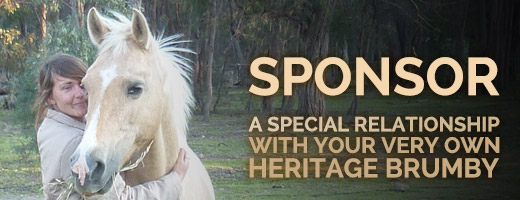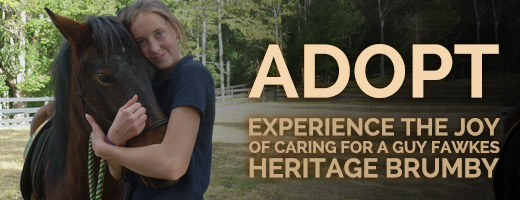Are Brumbies different from domestic horses?
Yes and no, being born in the wild Brumbies have a strong sense of ‘family’ or mob structure. There is a strict law of ‘pecking order’ and each horse has his definite place in the mob. His senses are highly developed, he is an intelligent, alert and thinking animal.
By tuning in to his natural abilities and showing him leadership but never domination, he will quickly become your friend and bond closely with you in a way domestic horses rarely achieve. His daily needs in captivity are no different from a domestic horse.
Are Brumbies savage, do they bite and kick?
Brumbies do not know hate, they live in the wild within a firm social structure of law and order. They are inquisitive and as they gain confidence will come to you with innocence and a willingness to trust. Repay them in like and they have no reason to bite or kick. Biting and kicking is a form of self defence, caused by fear and fright. Humans create these problems, not horses.
Are Brumbies diseased or inbred?
Free ranging horses living in the wild look after themselves very well.
They know what they need in terms of nutrition and will forage for it.
No horse that we have handled has been diseased, unhealthy or inbred; they have less worm burdens than domestic horses.
Horses from Guy Fawkes were D.N.A tested and showed less inbreeding than is found in the thoroughbred industry. We have not seen one genuine case of inbreeding in any horse that has gone through our programs. It is only when large numbers of horses are confined to small areas of grazing that inbreeding may occur and this is usual in any animal population, wild or domestic.
How big are Brumbies and what colours are they?
Brumbies come in all sizes and colours, the average height is somewhere between 13 to 15 hands high. Some brumbies on outback stations can reach 16 hands plus.
The horses we handle are mainly Galloways. They are stocky and strong boned and can carry weight. Colours range the spectrum, bays and chestnuts are the most common, this being the strongest genetic gene however the renowned Guy Fawkes
palominos and buckskins and the paint horses from the Oxley Wild Rivers,
Northern Tablelands account for around 20% of our horses.
I have young children learning to ride, are Brumbies safe for kids?
Given the right start in life Brumbies have excellent, calm temperaments overall however like children, they have to learn and be exposed to different situations. A young, green horse, Brumby or domestic, cannot be expected to have the experience of a pony that has had a lifetime of saddle work. This must be taken into account when choosing any horse
for kids, adopting a weanling that will mature and have close contact with the family before formal training is commenced is the best way to go and always, under the guidance of an experienced handler. Many of our Brumbies make excellent pony club horses and excel in all horse disciplines.
We don’t ride and have little experience but we have the land and would love to give a horse a good home, would we be suitable Brumby owners ?
Yes, Brumbies make great companion horses and are low maintenance, they don’t need rugs and stables, a good, well fenced, grassed paddock with fresh water, shade trees for protection from the weather and regular health, farrier and worm checks is all that is needed.
Some supplementary lucerne hay throughout the winter months may be necessary. Adopting a mare with a foal at foot is a good way to go, handling foals is very rewarding and a project a novice can easily take on. We don’t place solo horses, they must have a mate, horses are herd animals and very sociable, a solo horse is depressed and unhappy.
We sometimes have horses to place, simply as pets, Adoption fees are very reasonable as we take into account the security and contentment of their future life. Even very inexperienced people can enjoy the horses, particularly with a few carrots over the fence.
I would love to see the Brumbies, can I visit?
Yes, we always welcome visitors but you would need to arrange an appointment with us first. Our Inspection Days are open to the general public also, contact us for details and dates. A donation for volunteers’ time is always appreciated.
I’m an experienced horse person keen on Endurance Riding and am considering a Brumby, advice please ?
Brumbies make excellent endurance horses, they are sure footed and hardy in the bush which is their natural home. Many of our horses carry an infusion of Waler blood lines,
and horses from the Northern Tablelands were drafted for use in the Light Horse Regiments in earlier times, that should be a high enough recommendation.
How do you fund your programs?
Adoption fees account for approximately 50% of our income, donations and fund raisers finance the balance. We receive no funding from any other source. We have no paid staff, all are volunteers.
Where are you located?
Our main agistment Sanctuary is situated 28 klms. north west of Armidale in N.S.W.
Inspection Days open to the public are held as we have horses ready and available for Adoption. Our smaller Sanctuary is at Bellingen on the mid north coast of N.S.W.
Horses in our Sponsorship program live here, all are well handled and quiet and they love visitors.
What guidelines are there for Adoption?
Owners have legal responsibility for the horse on leaving our Sanctuaries and the horse is owned outright by the Adoptee. However we do ask for a signed Agreement in relation to the future wellbeing of the horse, we reserve the right to place horses to their best advantage and with the right people in terms of suitability and temperament.
We are available for ongoing advice and like to keep in touch with new owners.
Owners may sell the horse on but we ask, not within a twelve month period.
This is to stop exploitation as our Adoption fees are kept to a minimum, owning a Heritage Australian Brumby should be a privilege, not a commercial proposition for horse dealers.
If I don’t like my Brumby can I send him/her back?
Good question, generally the answer is ‘No’ except in very special circumstances.
The reason is simple, once a horse leaves our care we have no control over his handling. Horses placed ‘on trial’ can be ruined very quickly with the wrong treatment. If everyone who couldn’t catch their horse or who fell off due to bad riding and/or management wanted to return the horse the equine world would not function. This is why we have firm guidelines for Adoption and we give new owners every opportunity to spend time with their horse before a final decision is made. We have never had an owner yet who has wanted to return a horse to us.
We match the horse to the owner as best we can in terms of temperament and experience and we are available for advice if needed. Our appraisal of a chosen horse is well documented and we do not place horses if we think the selection is wrong.
Brumbies should stay wild and free, what comments?
We agree wholeheartedly but the populations must be controlled. We encourage experienced people with suitable agistment land to maintain a family mob for breeding and preservation. Such horses live wild but under supervision.
We believe that our wild horses should be a living continuation of Australia’s Heritage and should rightfully be allowed to roam on lands where they have traditionally been for over two hundred years. By passively removing horses from alleged threatened environments and by managing the numbers to an acceptable level, utilising the resources of the horses and making them available to the public we are contributing towards the future protection of the Australian Heritage Brumby. It is a far better solution than allowing numbers to build up to unmanageable proportions and horses slaughtered as a result.
We do the best we can, we save as many horses as possible, the overall responsibility is the job of Federal and State governments; this is why we seek to introduce programs similar to the BLM programs for the American Mustangs and to see long term management plans in place Australia wide.

